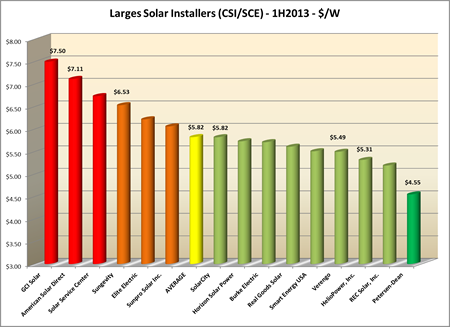Welcome to the
Run on Sun Monthly Newsletter

In this Issue: |
December, 2013
Volume: 4 Issue: 12
Solar Stocking Stuffer…
|
Get your copy of
Commercial Solar:
Step-by-Step
from
Run on Sun
Founder & CEO
Jim Jenal

Now available on Amazon.com
in both
Print & Kindle versions.
Bonus - Buy the Print version…
Get the
Kindle version for Free!
Commercial Solar:
Step-by-Step
from Run on Sun
Founder & CEO
Jim Jenal

Now available on Amazon.com
in both Print & Kindle versions.
Get the Kindle version for Free!
Help Us Spread the News!





How can Love Survive?In the stage version of The Sound of Music, there is a song about the perils of romance among the affluent titled, "How Can Love Survive"—sadly it was cut for the movie. But I've always liked that song and I was reminded of it while reading a piece over at greentechsolar that debated the question: Will smaller solar installers survive? Lest you have any doubt where we come out in this debate, the answer is simple: heck yeah! But let's see why… The debate was held last week at the U.S. Solar Market Insight event in San Diego and was reported on by the always interesting Herman Trabish in a piece titled, "GTM Debate: Will Smaller Installers Survive in Tomorrow's Solar Market?" (H/T solarwakeup.com) The debate featured Vivint Solar's VP Thomas Plagemann squaring off against SunPower's Residential Solar VP/General Manager Martin DeBono. Plagemann's comments reflect all of the arrogance and self-importance we have come to expect from such major players:
(Emphasis added.) To date, Vivint has mostly done its work outside of the California market, so that $2.50/Watt number is not reflective of their presence in our fair state. Indeed, when we last looked at CSI data for the first half of 2013, Vivint did not even crack our list of the top 16 installers. Here's that graph:
DeBono went on to suggest that forming a partnership with SunPower provides installers with leverage and a national brand. We agree that establishing partnerships is essential, though we might question the degree to which SunPower is a national brand in the way that matters most - consumer consciousness. Toward that end, we believe that partnering with a company like LG Electronics - which truly is a national brand and has the ad budget to prove it - makes more sense for small installers. But how do you get access to the other essentials of the business? Run on Sun has been exceptionally fortunate to have partnered with Focused Energy, who is much more than a premier distributor. They have not only been our primary supplier since we first connected a few years ago, but they have offered us support, flexibility and insight that has made them an essential part of our success. If you run a small solar business and you haven't connected with them yet, we would encourage you to check them out. As we have said many times, solar has to be more than just another business. We have to be better. At the end of the day, that is why the small installers will survive: because we care more, and that translates into greater value for our clients. |
Shape of Solar as 2013 EndsThanks to our friend Yann over at SolarWakeup.com we came across this great infographic summarizing the State of U.S. Solar in 2013 and we thought we would share that with our readers along with our observations. The folks at Greentech Media Research and the Solar Energy Industry Association (SEIA) compiled the report summarizing the State of Solar in the US, and you can download the Executive Summary here. Yet it is their infographic that really fired our imagination. 
Solar Every 4 MinutesThe graphic notes that "a solar system is installed every four minutes" in the U.S. which is a pretty amazing stat. We have an even more amazing stat to share that will be part of our new website roll-out this January. While you wait, take a guess: If 2% of the households in America that wanted solar, added solar in 2014, how fast would we be installing new solar systems? California LeadsEven as other markets around the country grow, California still leads the way. So let's grow it even faster - how about allocating some of those AB 32 auction funds to refreshing the solar rebate programs around the state - particularly for non-profits? So Long Coal?Despite our progress - 12 GW of total solar capacity installed - we have a long way to go to displace coal. According to the U.S. EIA, as of 2012 there were 310 GW of coal capacity installed, making solar just 3.8% of coal's share. Rocking the Solar WorldThe U.S. will hit 13% of global solar installations - a 30-year high - by the end of this year and that share will grow over the next four years. Of course, we invented this technology, we have abundant insolation resources and the people overwhelmingly want it - so all we need are the proper policies. As we wrap up 2013 and head into a bright new year, let's hope that we can push back the naysayers and the "not-so-smart ALECs" of the world and propel solar to reach its rightful dominance. |

